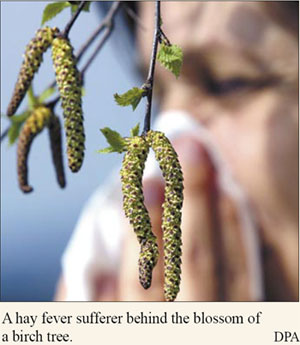Allergies are not to be sneezed at
WIESBADEN, Germany: Hay fever sufferers are getting hit even earlier. In Germany, pollen was already in the air in January, and February was worse.
Runny noses and burning eyes are not to be sneezed at, warns Professor Ludger Klimek, director of the Allergy Center in Wiesbaden.
"Hay fever causes mucous membranes to inflame and every inflammation does damage," he says.
Early flowering trees such as birches, alders, hazels and beeches start to release pollen in January or February.

"Then grass pollen flies in June, July and August," notes Gerhard Schultze-Werninghaus, vice president of the Bochum-based German Society for Allergology and Clinical Immunology. Histamine, a hormone produced by the body, is behind the inflammations.
"Antihistamines can be taken to suppress its effects," Schultze-Werninghaus advises.
While some earlier antihistamines tended to make people drowsy, he says, "there are newer products now that don't tire you out so much".
Also available are sprays and drops, both with and without cortisone, that have an anti-inflammatory effect on mucous membranes.
"Nasal rinses with sea-salt solutions can help, too," Klimek notes. Schultze-Werninghaus says that simply rinsing your eyes with clear water washed out pollen and alleviated irritation.
Immune therapies aim at desensitizing the body to the substance inducing the allergic reaction. During treatment, the immune system learns to react appropriately - and not too strongly - to pollen. Similar to an inoculation, the body is gradually confronted with more and more of the symptom-producing agent.
"The regulating cells become increasingly stable and the immune system learns that a defense reaction isn't necessary," Klimek explains.
Desensitizing treatments used to take several months. "The substances are more purified now. Three to four days of treatment, with a week between sessions, can suffice nowadays," Klimek says. The success rate exceeds 80 percent.
For people with confidence in homeopathic remedies, Herbert Ilsenstein, a non-medical practitioner from Bremen, recommends over-the-counter Aralia racemosa. Acupuncture can also ease hay fever symptoms. Simply adjusting your behavior is helpful.
"Wearing sunglasses can protect your eyes from pollen," Ilsenstein points out.
Since pollen is inhaled most deeply during athletic activities, "they should be reserved for the evening or morning," Klimek advises.
At home, it is better to ventilate rooms by opening windows wide for a short time than by keeping them open a crack. When coming in from outdoors, you should change clothes so that you bring in less pollen. "And people who wash their hair before going to bed inhale less pollen at night," Klimek says.
DPA
(China Daily 03/05/2008 page19)














